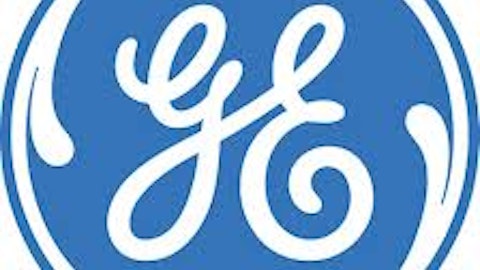John Brennan, former head of Vanguard and a Board member at General Electric Company (NYSE:GE), directly purchased 5,000 shares of GE on October 26th at an average price of $21.20 per share. Brennan had previously bought 20,000 shares of the company in August at $20.44 per share. See a history of Brennan’s insider purchases at GE and Hanover Insurance Group. We like to track insider purchases because statistically they tend to be bullish signals for a stock, as insiders shy away from buying shares and therefore reducing diversification unless they are confident in the company’s prospects. Read our review of studies on insider trading.
GE Capital reported slightly lower revenue in the third quarter of 2012 than in the same period last year, but stronger numbers in the rest of the conglomerate’s business brought the top-line up 3%. Net income was up 8%, and as the company had paid a sizable preferred dividend in the third quarter of 2011 earnings per share were up substantially. In the first nine months of the year, revenue has been about flat compared to the same point in 2011 (with GE Capital offsetting an improvement in the rest of the company’s operations) with net income down 9%. At a market capitalization of just over $220 billion, General Electric Company trades at 17 times trailing earnings. Given its modest growth rate and its 3.2% dividend yield, that seems to us like a reasonable price for the company. Sell-side analysts expect considerable growth in earnings per share next year, with their consensus implying a forward P/E of 12.
Billionaire George Soros was buying in the second quarter of 2012: Soros Fund Management increased its holdings of General Electric Company to a total of 8.6 million shares by the end of June. At a market value of nearly $180 million, this was the third largest long equity position that the fund reported in its 13F filing (find more of billionaire George Soros’s favorite stocks).
The best peers for GE are engineering and industrial company Siemens AG (NYSE:SI) and technology and materials manufacturer Honeywell International Inc. (NYSE:HON). Both of these companies match GE on a forward earnings basis with a P/E multiple of 12. In order to reach that point, it’s Siemens which requires the least improvement, at a trailing P/E of 16, and Honeywell which requires the most (it trades at 21 times trailing earnings). These companies are smaller than GE, but saw better earnings growth versus the previous year in their most recent quarters. With higher growth expected in the future, Siemens and Honeywell have five-year PEG ratios less than 1. Unless their slightly lower dividend yields are an issue, we’d actually advise investors to take a look at those companies.
We can also compare GE to conglomerate 3M Co (NYSE:MMM) and testing and diagnostics company Danaher Corporation (NYSE:DHR). These companies trade at premiums to the companies we’ve already discussed on a forward basis, with 3M priced at 13 times forward earnings estimates and Danaher trading at a forward P/E of 15. These earnings estimates reflect very low forward growth in both cases, with each company’s trailing earnings multiple being just one point higher. This actually makes them traditional value stocks for this peer group. However, the low trailing earnings multiples reflect only modest growth rates in the recent past over a year earlier. There is a case to be made for 3M, as the cheapest of these stocks on a trailing basis, but Danaher doesn’t carry that big a discount to GE and with a much smaller market cap and dividend we don’t think that it’s as good a buy.
There’s also the insider purchase factor to consider, and we certainly wouldn’t advise any current investors to leave the stock at this point; if it’s good enough for a Board member to be buying, it’s probably good enough to stay in. Investors looking at buying shares of GE, though, may want to consider the company’s peers as well.






